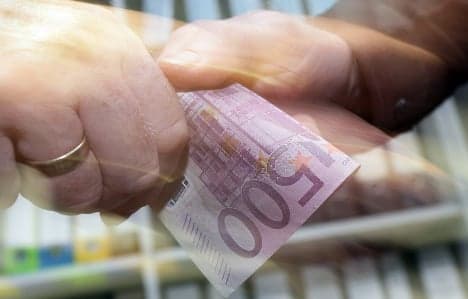Firms: We need UN anti-corruption law

More than 30 German CEOs are demanding that parliament finally ratify the UN's Convention Against Corruption. The move has been blocked by MPs concerned about their own liability.
Some of Germany's best-known company bosses have signed the letter, including Siemens, Daimler, Allianz, Deutsche Bank, Lufthansa and ThyssenKrupp. They say parliament's failure to pass the agreement into law - even though Germany signed it at its inception - "harms the reputation of German companies in their activities abroad."
The UN Convention Against Corruption has been ratified by around 160 states since it was drawn up in 2003. Among the G20 member states, only Germany, Saudi Arabia and Japan have not ratified it, the business chiefs pointed out.
Their letter, dated end of June, was only published on Wednesday.
The convention requires its signatories to prosecute both corrupt and corruptible public officials, which would require a change in German law. Until now, only buying and selling MP's votes is illegal, but the UN convention also requires offering or accepting unjustified offers to be punished.
There have been several attempts to pass the proposals into law since 2003. In this legislative period, which began in 2009, all the bills have come from the opposition parties - the Social Democratic Party, the Green Party, and the Left party - and been blocked by the conservative Christian Democrats and the Free Democratic Party.
The government coalition is concerned that the convention makes no distinction between state employees and elected officials, the Financial Times Deutschland newspaper reported on Wednesday.
They say that unlike civil servants, MPs are not bound to any specific duties - parliamentarians are free and must be able to make free decisions.
"The actions of MPs should be bound by Bundestag rules and not criminal law," argued Siegfried Kauder, CDU chairman of the parliamentary committee that examined the proposals.
The coalition fears that state prosecutors would begin investigating MPs’ meetings with lobby groups and the invitations they accept to meet industry associations and individual companies.
The German companies say the failure to ratify the treatment has a real effect on their businesses activities abroad, and makes them look hypocritical.
"It always appears inconsistent if German companies require that their foreign business partners to conform to anti-corruption rules, but Germany as a state does not want to ratify the UN's anti-corruption convention," said Stefan Wernicke head legal advisor to the German Chambers of Industry and Commerce (DIHK).
The Local/AFP/bk
Comments
See Also
Some of Germany's best-known company bosses have signed the letter, including Siemens, Daimler, Allianz, Deutsche Bank, Lufthansa and ThyssenKrupp. They say parliament's failure to pass the agreement into law - even though Germany signed it at its inception - "harms the reputation of German companies in their activities abroad."
The UN Convention Against Corruption has been ratified by around 160 states since it was drawn up in 2003. Among the G20 member states, only Germany, Saudi Arabia and Japan have not ratified it, the business chiefs pointed out.
Their letter, dated end of June, was only published on Wednesday.
The convention requires its signatories to prosecute both corrupt and corruptible public officials, which would require a change in German law. Until now, only buying and selling MP's votes is illegal, but the UN convention also requires offering or accepting unjustified offers to be punished.
There have been several attempts to pass the proposals into law since 2003. In this legislative period, which began in 2009, all the bills have come from the opposition parties - the Social Democratic Party, the Green Party, and the Left party - and been blocked by the conservative Christian Democrats and the Free Democratic Party.
The government coalition is concerned that the convention makes no distinction between state employees and elected officials, the Financial Times Deutschland newspaper reported on Wednesday.
They say that unlike civil servants, MPs are not bound to any specific duties - parliamentarians are free and must be able to make free decisions.
"The actions of MPs should be bound by Bundestag rules and not criminal law," argued Siegfried Kauder, CDU chairman of the parliamentary committee that examined the proposals.
The coalition fears that state prosecutors would begin investigating MPs’ meetings with lobby groups and the invitations they accept to meet industry associations and individual companies.
The German companies say the failure to ratify the treatment has a real effect on their businesses activities abroad, and makes them look hypocritical.
"It always appears inconsistent if German companies require that their foreign business partners to conform to anti-corruption rules, but Germany as a state does not want to ratify the UN's anti-corruption convention," said Stefan Wernicke head legal advisor to the German Chambers of Industry and Commerce (DIHK).
The Local/AFP/bk
Join the conversation in our comments section below. Share your own views and experience and if you have a question or suggestion for our journalists then email us at [email protected].
Please keep comments civil, constructive and on topic – and make sure to read our terms of use before getting involved.
Please log in here to leave a comment.